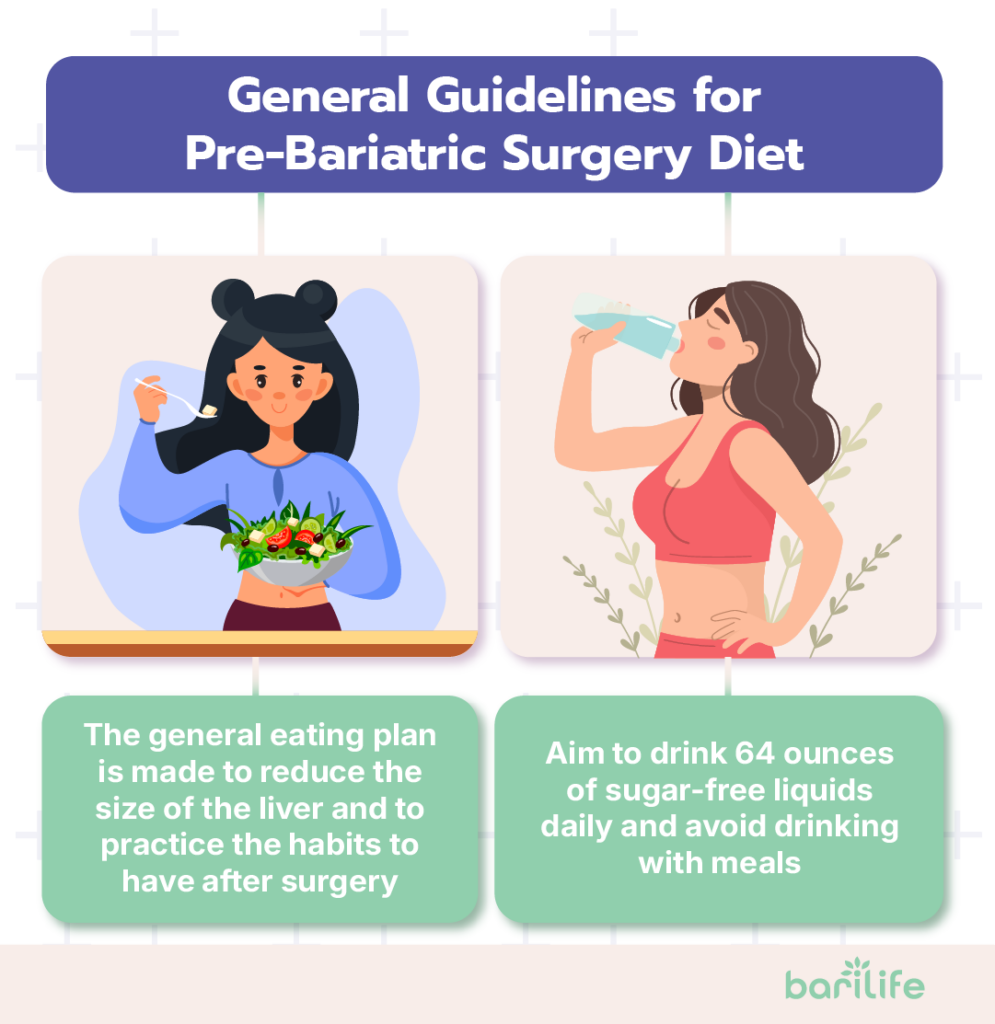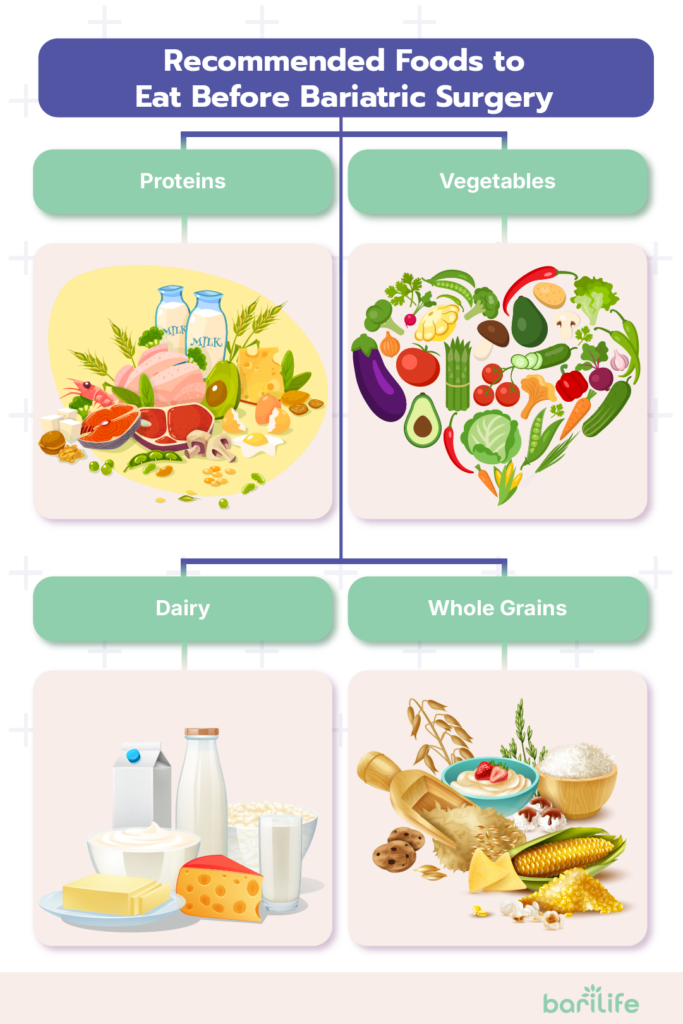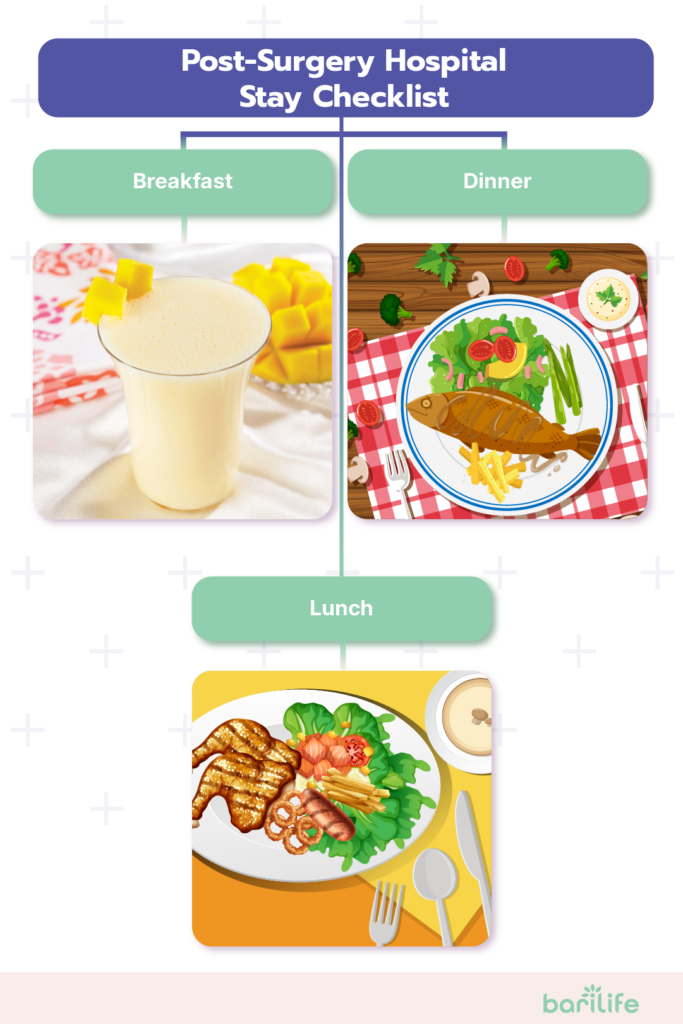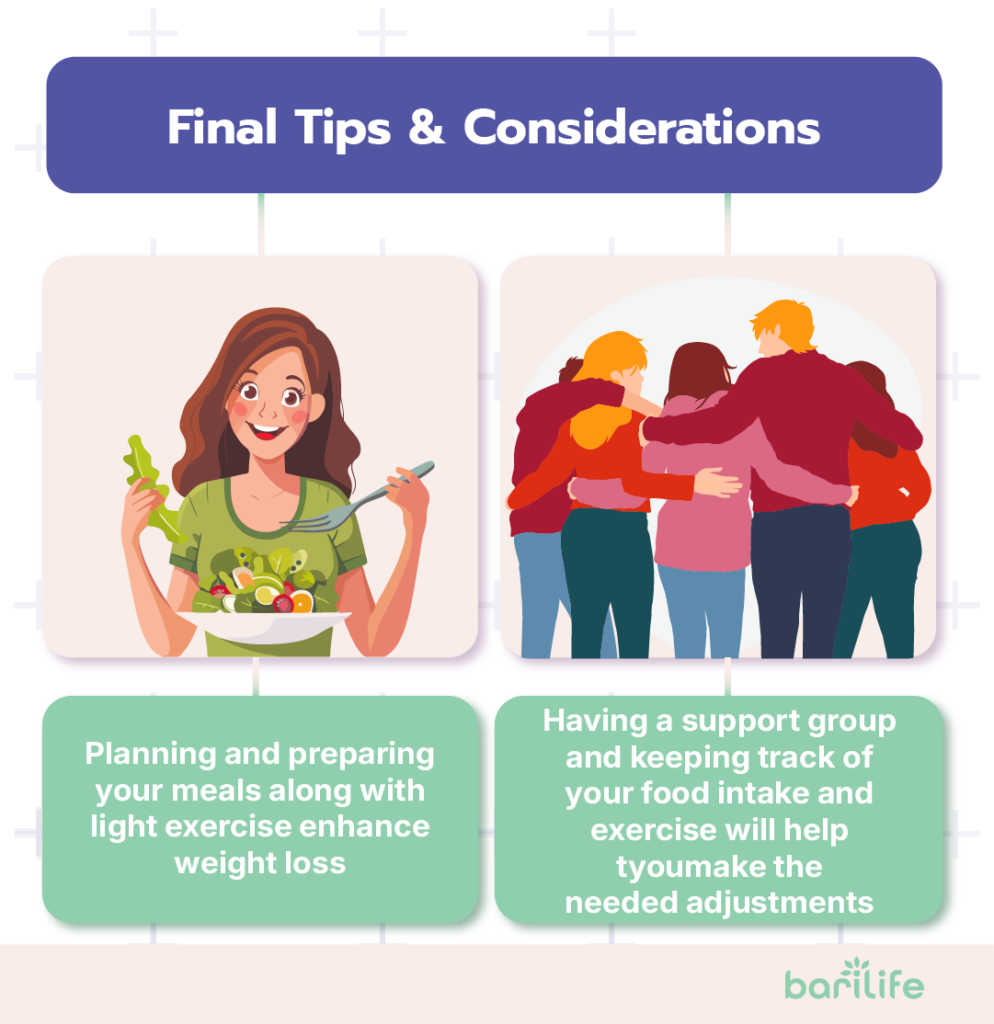Key Takeaways
- Adhering to a high-protein, low-calorie diet two weeks before bariatric surgery helps reduce your liver size, facilitating a safer surgical procedure.
- It’s important to avoid foods high in fat and refined carbohydrates before surgery as these foods don’t provide nutrition or support healthy weight management.
- Following your medical teams dietary guidelines helps ensure the best outcome for your surgery and recovery.
Several weeks before your bariatric surgery, your medical team will have you start following a specific eating plan.
The purpose of this is to prepare your body for surgery and help you practice your post-surgery diet.
This guide walks you through the types of foods you’ll need to include, which to avoid, and gives you a sample meal plan.
Table of Contents
General Guidelines for Pre-Bariatric Surgery Diet

Your surgical team will provide dietary guidelines that typically begin two to three weeks before your surgery date. This eating plan serves multiple purposes:
- Reduce the size of your liver
- Help you practice the eating habits required after the procedure
Most programs recommend consuming 800 to 1200 calories daily, spread across four to six small meals.
Including bariatric vitamins in your daily routine is also essential to ensure proper nutrition leading up to surgery.
It’s also crucial to stay hydrated. Aim to drink 64 ounces of sugar-free liquids daily and avoid drinking with meals. You should also avoid eating or drinking at least two hours before bedtime.
Learning how to follow this way of eating is critical. Some surgical teams postpone procedures if their clients have not properly followed the pre-operative diet.
Recommended Foods to Eat Before Bariatric Surgery
The pre-surgery eating plan focuses on nutrient-dense and low-calorie foods. These foods provide maximum nutrition while supporting your pre-surgery weight loss goals.
Proteins
With that in mind, lean proteins should make up 25% to 30% of your food intake. Excellent choices include:
- Skinless chicken breast
- Turkey
- White fish
- Egg whites
Limit lean cuts of beef as they have a higher fat content.
Healthy ways to prepare your proteins include baking and grilling rather than frying.
Vegetables
Non-starchy vegetables are your best friends during the preparation period. The following vegetables are packed with vitamins, minerals, and fiber while being naturally low-calorie.
- Broccoli
- Spinach
- Cauliflower
- Green beans
- Bell peppers
- Leafy greens
Eating these vegetables helps you feel full, provides essential nutrients, and supports healthy digestion. You can eat them in larger portions compared to other food groups.
Steaming, roasting, and grilling are healthy ways to prepare vegetables. Stay away from vegetables that are sauteed or fried.
Dairy
You also need to include low-fat dairy products. Some good sources are:
- Skim milk
- Low-fat yogurt
- Low-fat cottage cheese

These foods are high-quality protein and help you meet your calcium needs. Just be mindful of your portions, as even low-fat dairy products contain natural sugars.
Whole Grains
If your program allows whole grains, choose high-fiber options, such as:
- Oatmeal
- Quinoa
- Brown rice
These complex carbohydrates provide sustained energy and important nutrients, but they should make up a smaller part of your diet than proteins and vegetables.
Foods to Avoid Before Bariatric Surgery
Certain foods work against weight loss and are void of necessary nutrients. Eating these foods fills you up without giving you any nutrition and works against your weight management goals.
High-Fat Foods
High-fat foods are the number one food to avoid. Fat takes longer to digest and does not support having a healthy weight. High fat foods to avoid include:
- Fried foods
- Fatty cuts of meat
- Full-fat dairy products.
Be wary of hidden fat sources like salad dressings, mayonnaise, and oils. Even healthy foods, like nuts and avocados, should be limited because they have a high fat content.
Refined Carbohydrates
Avoid refined carbohydrates and sugary foods. These foods include:
- White bread
- Pasta
- Cookies
- Cakes
- Candies
- Sugary drinks
Watch out for seemingly innocent items like granola bars, flavored yogurts, and fruit juices, as they often contain hidden sugars.
While it might be tempting to have that “one last treat,” remember that eating the wrong foods can seriously impact your surgery.
During your pre-surgery diet, every calorie counts toward proper nutrition and preparing your body for the procedure.
Sample Meal Plan for a Pre-Bariatric Surgery Diet
Here is an example of what a daily meal plan may look like when following a pre-bariatric surgery diet.
- Breakfast: Protein shake or two egg whites with 1/2 cup low-fat cottage cheese
- Morning Snack: Small apple with one ounce low-fat cheese
- Lunch: Three ounces grilled chicken breast with one cup steamed vegetables

- Afternoon Snack: Sugar-free yogurt with 1/4 cup berries
- Dinner: Three ounces of baked fish with one cup roasted non-starchy vegetables
- Evening Snack: Protein shake or 1/2 cup low-fat cottage cheese
Pre-Op Liquid Diet
In the final days before your surgery, your surgeon will require you to switch to a clear liquid diet. An empty stomach reduces surgical risks and helps prevent complications during anesthesia.
During this brief but important phase, you’ll be limited to these specific clear liquids:
- Clear broths or bouillon
- Sugar-free gelatin
- Clear protein drinks
- Water
- Sugar-free clear beverages
You want to set a schedule to consume these liquids every two to three hours while you’re awake. This is important to help you maintain your energy levels and prevent dehydration.
However, remember that you should stop consuming all liquids at the exact time your surgeon specifies before your procedure. This is typically 12 hours before surgery.
Final Tips & Considerations
Embarking on the journey toward bariatric surgery is a significant step toward achieving a healthier lifestyle. Proper preparation, especially regarding your diet, plays a crucial role in the success of the procedure and your long-term well-being.
Here are some final tips and considerations to keep in mind:
- Plan and prepare your meals: Organizing your meals in advance helps you adhere to your dietary plan and avoid last-minute unhealthy choices. Consider preparing simple, no-cook meals, especially if you have limited time or cooking facilities.
- Engage in regular physical activity: Incorporating regular exercise can enhance weight loss and improve surgical outcomes. Activities like walking, strength training, and morning exercises boost metabolism and support weight management goals.
- Seek support: Consider joining a support group or connecting with others who are undergoing bariatric surgery. Sharing experiences and tips can provide emotional encouragement and practical advice. Additionally, consulting with a registered dietitian can offer personalized nutritional guidance tailored to your needs.

- Monitor your progress: Keep a journal to track your food intake, physical activity, and any challenges you encounter. This practice can help you stay accountable and make necessary adjustments to your plan.
How Bari Life Can Help
Bari Life offers specialized pre-surgery diet kits and liquid diet resources designed to support you during this critical phase.
The pre-surgery diet kits include a variety of bariatric protein shakes, bariatric protein bars, and bariatric snacks to help you meet your nutritional goals.
The liquid diet resources, including clear broths, protein-enriched drinks, and sugar-free beverages, to support you during this phase.
Explore Bari Life’s pre-surgery diet kits and liquid diet resources to ensure you’re on the path to success.
Conclusion
Preparing For Bariatric Surgery requires dedication and commitment to a structured, nutrient-rich diet. By following your medical team’s guidelines, prioritizing lean proteins, non-starchy vegetables, and healthy hydration, you set yourself up for a smoother surgery and successful recovery. Avoiding high-fat foods, refined carbohydrates, and last-minute indulgences is essential to ensure optimal surgical outcomes.
As your surgery date approaches, sticking to your pre-op diet and transitioning to the required liquid phase will further enhance your readiness. Remember, this journey is not just about surgery—it’s about adopting sustainable, healthy habits that will support your long-term weight loss and well-being. Stay consistent, seek support, and trust the process—your new, healthier future is within reach!
If you want to learn more, why not check out these articles below:
- How Long From Consultation To Bariatric Surgery?
- What To Expect at First Bariatric Appointment?
- How Long Do You Have To Stop Smoking Before Bariatric Surgery?
- Questions To Ask Bariatric Surgeon
- Bariatric Surgery Must Haves
- Bariatric Surgery Hospital Checklist
Resources
Spotting Hidden Sugars in Everyday Foods. (2024). Centers For Disease Control and Prevention.



What are your tips and tricks to post-bariatric success?